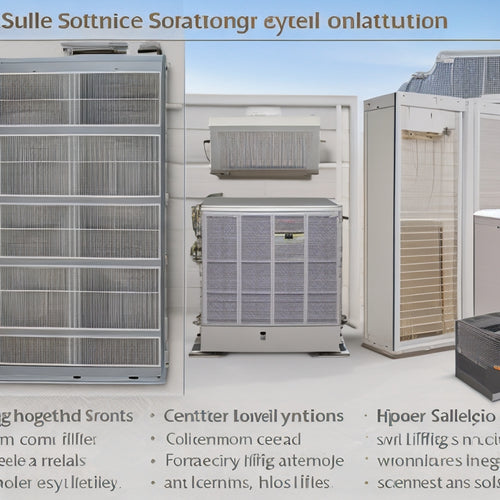
Elevate Your Fleet: 5 Roofing Systems for Delivery
Share
You're looking to elevate your delivery fleet's efficiency, reduce carbon footprint, and cut energy expenses. Consider integrating solar panels into your roofing system. There are five systems to explore: thin-film solar panels for flexibility and durability, rigid solar panels for rooftop installations, flexible solar panels for curved roofs, integrated solar roofing solutions for a seamless system, and solar panels for a reduced reliance on fossil fuels. Each system offers unique benefits, from energy harvesting to extended vehicle lifespan. Discover the perfect fit for your fleet and take the first step towards a more sustainable future.
Key Takeaways
• Integrating solar panels into roofing systems reduces delivery fleets' carbon footprint and energy expenses while powering essential systems.
• Thin-film solar panels offer flexibility, durability, and high energy conversion rates, making them ideal for fleet vehicles.
• Rigid solar panels provide a robust means of harnessing solar energy on rooftops, with exceptional durability and high energy harvesting efficiency.
• Flexible solar panels conform to curved roof surfaces, offering aerodynamic integration and customized mounting options for secure installation.
• Integrated solar roofing solutions combine photovoltaic panels with advanced roofing materials, providing a seamless, high-performance roofing system with energy storage capabilities.
Boosting Delivery Efficiency With Solar
In addition to integrating solar panels into your roofing system, you can greatly reduce your delivery fleet's carbon footprint and energy expenses, while also increasing your bottom line. This innovative approach to vehicle integration enables you to harness the power of the sun, converting it into clean energy to fuel your fleet's operations.
Through energy harvesting, you can power essential systems, such as refrigeration units, lighting, and communication devices, reducing your reliance on fossil fuels. This not only benefits the environment but also enhances your fleet's efficiency, as you'll spend less on fuel and maintenance.
Additionally, solar-powered roofing systems can extend the lifespan of your vehicles, as they reduce the strain on engines and electrical systems. By embracing this sustainable solution, you'll not only reduce your environmental impact but also boost your fleet's overall performance and profitability.
Thin-Film Solar Panels for Fleets
You can optimize your fleet's energy harvesting capabilities with thin-film solar panels, which offer a unique combination of flexibility, durability, and high energy conversion rates.
These panels are designed to be lightweight, making them an ideal choice for fleet vehicles where weight reduction is essential.
Thin-film solar panels are also highly resistant to scratches, cracks, and corrosion, ensuring they can withstand the rigors of daily use.
Rigid Solar Panels for Roofs
Rigid solar panels, designed for rooftop installations, provide a robust and efficient means of harnessing solar energy, particularly suited for delivery fleets with fixed roofs. As you consider integrating rigid solar panels into your fleet's roofing system, you'll appreciate their exceptional panel durability. These panels are built to withstand harsh weather conditions, ensuring a long lifespan and minimizing maintenance needs.
By harnessing the power of the sun, you'll reduce your fleet's carbon footprint and lower energy costs. You'll find that rigid solar panels are highly efficient in energy harvesting, converting sunlight into usable electricity to power your vehicles' systems. With a rigid solar panel system, you can expect a significant reduction in fuel consumption and emissions, making your fleet more eco-friendly.
Additionally, the sleek design of these panels allows for easy installation and integration with your existing roofing system. By choosing rigid solar panels, you're investing in a reliable, sustainable, and cost-effective solution for your delivery fleet.
Flexible Solar Panels for Curved Roofs
Flexible solar panels, designed to conform to curved roof surfaces, offer a unique solution for delivery fleets with non-standard roof geometries, allowing you to harness solar energy even on irregularly shaped vehicles. These panels provide an innovative way to integrate solar power into your fleet, regardless of the vehicle's design.
When considering flexible solar panels for your curved roofs, keep in mind the following key benefits:
-
Aerodynamic Integration: Flexible solar panels are designed to fit seamlessly into your vehicle's curved roof, ensuring minimal wind resistance and excellent aerodynamics.
-
Customized Mounting: Our flexible solar panels come with customized mounting options, ensuring a secure and reliable installation that meets your vehicle's unique requirements.
-
Increased Energy Harvesting: With flexible solar panels, you can harness more energy from the sun, even on curved roof surfaces, reducing your reliance on traditional fuel sources.
- Improved Safety: By integrating solar power into your fleet, you're reducing your carbon footprint and promoting a safer, more sustainable future for your drivers and the environment.
Integrated Solar Roofing Solutions
Building on the benefits of flexible solar panels, integrated solar roofing solutions take energy harvesting to the next level by combining photovoltaic panels with advanced roofing materials to create a seamless, high-performance roofing system. As you consider integrating solar power into your delivery fleet's roofing, you'll want to verify that your system meets local building codes and safety standards.
Integrated solar roofing solutions are designed to provide a watertight seal, ensuring that your cargo and crew remain safe and dry. These advanced roofing systems also provide a unique opportunity for energy storage. By integrating energy storage capabilities, you can store excess energy generated during the day for use during periods of low sunlight or at night. This not only increases your fleet's energy independence but also reduces your reliance on grid power.
When selecting an integrated solar roofing solution, look for systems that meet or exceed local building codes and safety standards. By doing so, you'll be able to harness the power of the sun while maintaining the highest levels of safety and performance.
Frequently Asked Questions
Can Solar Panels Be Installed on Leased Vehicles?
"When leasing a vehicle, you'll encounter lease restrictions on customizations, including solar panel installations. For instance, UPS's alternative fuel vehicle fleet integration project highlights the feasibility of solar-powered vehicles, but check your lease terms before making modifications."
How Do Solar Panels Affect Vehicle Insurance Rates?
When you install solar panels on your vehicle, you might wonder how it affects your insurance rates. You'll be relieved to know that some insurers offer insurance discounts for eco-friendly upgrades, but others may increase your premium due to the added value of the panels.
Are There Any Government Incentives for Solar-Equipped Fleets?
You'll be pleased to know that yes, there are government incentives for solar-equipped fleets, including Tax Credits and Renewable Grants, which can greatly offset the initial investment, making the shift to solar more affordable and secure for your business.
Can Solar Panels Be Transferred to New Vehicles?
You'll be interested to know that 80% of solar panels last up to 30 years; now, regarding transferring solar panels to new vehicles, it's possible, but you'll need to take into account battery life and vehicle upgrades to guarantee a seamless shift.
Do Solar Panels Void Vehicle Manufacturer Warranties?
When you install solar panels, you're likely wondering if they'll void your vehicle's warranty. Generally, they won't, but you should review your manufacturer's warranty terms for any restrictions, as some may have specific guidelines or requirements to avoid warranty concerns.
Related Posts
-

Why Solar HVAC Filters Revolutionize Home Energy Efficiency
By adopting solar HVAC filters, you're shifting your home's energy reliance from fossil fuels to clean, renewable sou...
-

7 Best Home Hydrogen Fuel Cells for Clean Power
You're considering adopting hydrogen fuel cells for clean power at home, but you want to know the best options. Reput...
-

3 Earth-Loving Furniture Tips for Energy-Smart Homes
When furnishing your energy-smart home, you have the power to reduce your carbon footprint greatly by making consciou...


